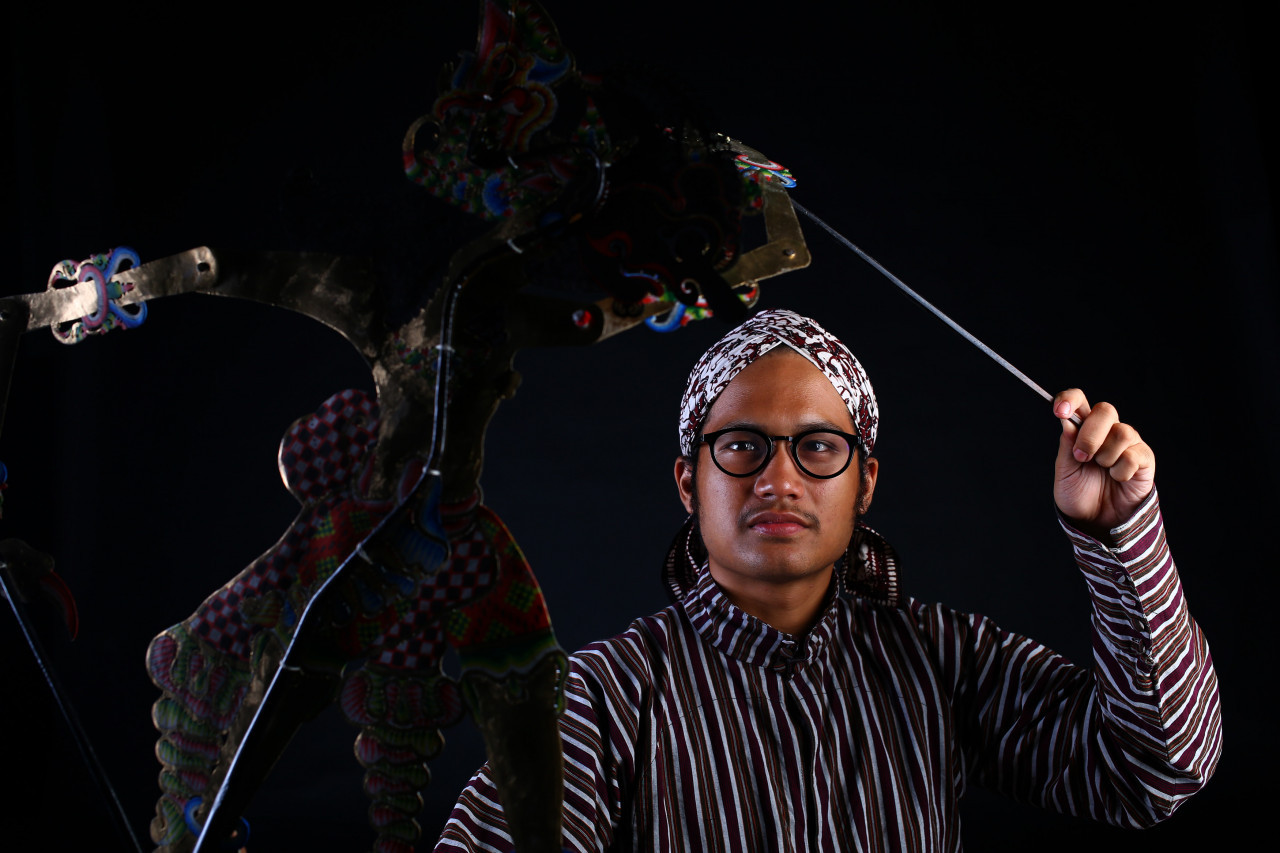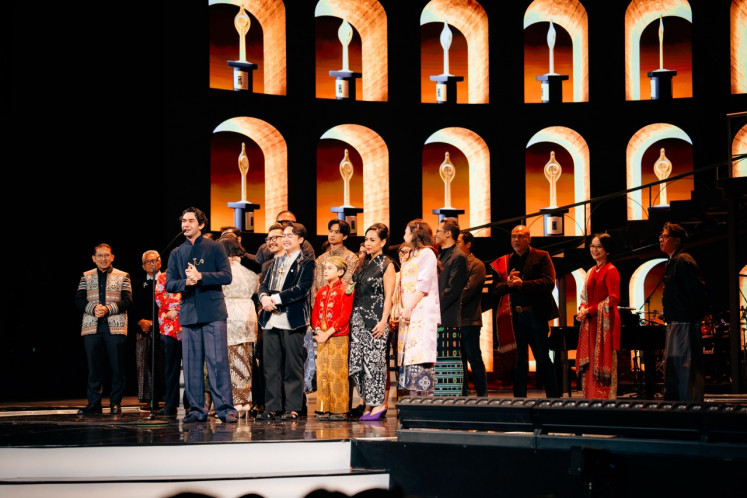Popular Reads
Top Results
Can't find what you're looking for?
View all search resultsPopular Reads
Top Results
Can't find what you're looking for?
View all search resultsGen-Z ‘dalang’ loves tradition, embraces modernity
Dressed in dalang (puppeteer) attire, comprising loose lurik shirt, kain jarik (traditional Javanese cloth) and blangkon (traditional Javanese hat), Gibran then sat crossed-legged on the floor.
Change text size
Gift Premium Articles
to Anyone
G
ibran Nicholau Papadimitriou, 18, arrived at The Jakarta Post’s studio earlier this year, carrying some of his collection of wayang kulit (leather puppets) and wayang golek (three-dimensional wooden puppets).
Dressed in dalang (puppeteer) attire, comprising loose lurik shirt, kain jarik (traditional Javanese cloth) and blangkon (traditional Javanese hat), Gibran then sat crossed-legged on the floor.
When the camera rolled, Gibran moved his wayang and spoke a dialogue in Javanese. There was no stage lighting to dim nor a gamelan set, but his very brief performance brought life to the Post’s studio.
Gibran, who is also known as Ki Kawipujo Permadi, is a young dalang. Last year he performed Nakula Sadewa Murca at the Wayang Museum in West Jakarta to celebrate National Wayang Day.
The Gen-Z dalang seems to embrace Indonesian cultural heritage both on and off stage. On Instagram, he frequently shares about his activities and stories on wayang, piquing people’s curiosity about the traditional puppet show.
While most people his age are still unsure about their career choices, Gibran has always known that he wanted to be a dalang. His mother, Indonesian filmmaker Nia Dinata, introduced him to wayang when he was in junior high school.
“[At that time], I questioned the existence of God,” he recalled. “My mother asked me to accompany her to see the Satu Suro [a celebration of Javanese New Year] in Yogyakarta and I watched wayang.”
Gibran, who had always been interested with the world’s mythologies, was instantly hooked. “When I was in seventh grade, I had a 500-word assignment about wayang. I [ended up] writing a 1,500-word essay,” he laughed. “Since then, I have been certain that wayang is my calling.”
The student of Javanese literature at Gajah Mada University in Yogyakarta also said that wayang has made him believe in God.
“Since a dalang cannot be an atheist, [it makes me think] that God does exist,” he added, comparing his experience to Walisongo Sunan (Honorable) Kalijaga who used wayang kulit performances to spread Islam.
Gibran continued to hone his skills by learning from senior dalang, including Ki Agustinus Sardjono. “You can [type] Ki Sardjono into Google and will find that he’s a blind dalang who performed in front of Barack Obama,” he mentioned. He shared his admiration, saying that Ki Sardjono with his disability motivated him to learn more.
Asked about his profession as a dalang, Gibran humbly said that he did not really deserve the title.
Wayang shows are known for sharing religious and moral values. “Dalang [is from the Javanese words] ngudal piwulang, meaning to provide teaching,” he explains.
According to Gibran, being a dalang bears a heavy responsibility. He often questions himself whether he has applied the teachings he shares in his own life. “But it all depends on the public, do they see me as a dalang?” he adds.
Read also: 'Sirnaning Pageblug' leads wayang theater to virtual horizons
As a young dalang, he realized that his profession might appear as a dead-end-job in the 21st century. “[Some may think] that we can’t even perform as there’s no market, let alone get an income,” he exclaimed.
But Gibran begged to differ, saying the profession was a window of opportunity. In addition to performing the wayang, Gibran said that he did other roles in wayang shows, such as playing the gamelan.
He also mentioned that he had done various jobs, such as teaching Javanese script and translating film subtitles.
His profession as dalang has also allowed him to be a consultant for cultural projects.
Wayang itself comes with various innovations. Gibran, for instance, has collaborated with Marawis Reggae, a musical group formed by the children of Wisma Karya Bakti Orphanage in Depok, West Java, to perform wayang marge or marawis reggae. “It’s a wayang show accompanied by reggae music,” he said.
When asked how wayang could be accepted by people of all ages, he replied that a dalang also needed to make efforts. “The government has done a good job by declaring World Wayang Day. But [it’s not enough],” he said. “A tiny step that can be done [by] a dalang is using social media to simplify wayang stories."
While still following pakem [beliefs], Gibran shared that he posted informational captions about wayang on social media, hoping to capture the younger generation’s interest.
He also hoped that one day he could do a wayang performance with impromptu translations to overcome any language barrier, as wayang shows are usually performed in the Javanese language.
“The translation will be more satisfying than a synopsis in a brochure,” he said. (wng)











